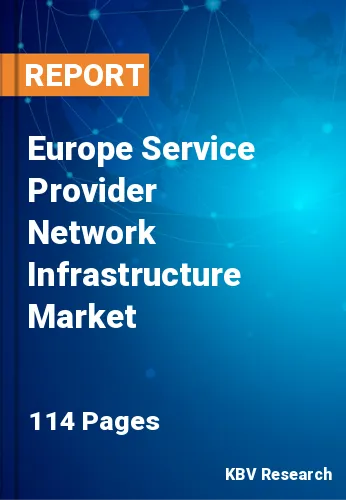
The Europe Service Provider Network Infrastructure Market would witness market growth of 4.0% CAGR during the forecast period (2022-2028).
A network service provider (NSP) is a business that owns, operates, and sells access to backbone infrastructure and services on the Internet. Other service providers, such as internet service providers (ISPs), are NSPs' principal customers. ISPs, in turn, sell internet access to companies and consumers. However, several network service companies also serve as ISPs. Backbone providers are another term for NSPs. NSPs construct and maintain the fiber cable and core routers that make up the internet's main data pathways. Their physical connections meet at internet exchange points, which are locations where regional ISPs can connect to a backbone provided by an NSP. Peering points are another name for these places.
The growth of corporate Internet applications and services contributed to the Internet's quick commercialization. Other additional causes contributed to this phenomenon. One significant aspect was the early 1980s launch of the personal computer (PC) and workstation, supported by exceptional advancements in combined circuit design and the ensuing sharp decrease in computer prices. The development of Ethernet and other "local area networks" (LANs) to connect personal computers was another aspect that gained relevance.
The digitalization of diverse nations is a goal of cloud computer and communication technology in Europe. The use of a hybrid cloud is essential for the digitalization of industries. New, cutting-edge projects and techniques are constantly being developed and implemented using cloud infrastructure. Key companies in the area are aggressively investing in research and development operations to provide companies with omnichannel cloud strategies and meet the constantly developing digital environment.
For instance, in October 2019, the renowned technology services firm NTT Limited introduced a new cloud infrastructure in Paris. When establishing a hybrid and multichannel cloud strategy, SMEs in France and other regions will profit from this technological advancement. Government programs like the G-Cloud architecture also make it possible for regional governments and companies to utilize these services efficiently.
Digitalization is the goal of spending on information technology and cloud computing throughout several European countries. Hybrid cloud technology makes it possible to achieve the objective of digitalizing industries. New and fascinating projects and methodologies are developed and put into practice using cloud technology. To provide businesses with multichannel cloud strategies and satisfy the expectations of the rapidly evolving digital landscape, all the significant players in this market are pouring enormous resources into research and development efforts. The digitalization and the adoption of the cloud services boost the service provider network infrastructure market.
The Germany market dominated the Europe Service Provider Network Infrastructure Market by Country in 2021, and would continue to be a dominant market till 2028; thereby, achieving a market value of $10,857.5 million by 2028. The UK market is estimated to grow at a CAGR of 3.2% during (2022 - 2028). Additionally, The France market would witness a CAGR of 4.8% during (2022 - 2028).
Based on Enterprise Size, the market is segmented into Large Enterprises and Small & Medium Enterprises. Based on Industry, the market is segmented into BFSI, Government & Defense, Manufacturing, Telecom & IT, Retail & Ecommerce, and Healthcare & Life Sciences. Based on Technology, the market is segmented into Broadband Access & Optical Transport, Routers & Switches, Carrier IP Telephony, Microwave transmission & Mobile Backhaul, and Wireless Packet Core. Based on countries, the market is segmented into Germany, UK, France, Russia, Spain, Italy, and Rest of Europe.
Free Valuable Insights: The Global Service Provider Network Infrastructure Market will Hit $174.1 Billion by 2028, at a CAGR of 4.5%
The market research report covers the analysis of key stake holders of the market. Key companies profiled in the report include Huawei Technologies Co., Ltd., Juniper Networks, Inc., Broadcom, Inc., Alcatel-Lucent Enterprise, Avaya Inc., ZTE Corporation, Ericsson AB, Aruba Networks (Hewlett Packard Enterprise Company), and Nokia Corporation.
By Enterprise Size
By Industry
By Technology
By Country
Our team of dedicated experts can provide you with attractive expansion opportunities for your business.
